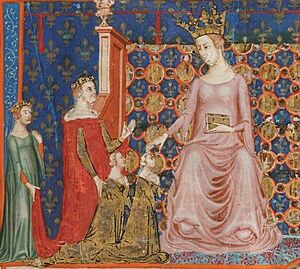Sancia of Majorca facts for kids
Quick facts for kids Sancia of Majorca |
|
|---|---|

Queen Sancha from the Bible of Naples.
|
|
| Queen consort of Naples | |
| Tenure | 1309–1343 |
| Born | c. 1281 |
| Died | 28 July 1345 (aged c.64) Santa Maria della Croce Naples |
| Burial | Firstly Santa Maria della Croce, later Santa Chiara Basilica. |
| Spouse | Robert, King of Naples |
| House | House of Barcelona |
| Father | James II, King of Majorca |
| Mother | Esclaramunda of Foix |
| Religion | Roman Catholicism |
Sancia of Majorca (born around 1281 – died July 28, 1345), also known as Sancha, was the Queen of Naples. She held this title from 1309 to 1343 as the wife of Robert the Wise. After her husband's death, she became a regent for her step-granddaughter, Joanna I of Naples, from 1343 to 1344.
Contents
Early Life and Marriage
Sancia was born around 1281. She was the daughter of James II, King of Majorca and Esclaramunda of Foix. She was one of six children in her royal family.
In 1304, Sancia married Robert, Duke of Calabria. Their wedding happened in two parts. First, a ceremony took place in Perpignan where someone stood in for Robert. A few months later, on September 20, they had their actual wedding in Collioure. Sancia and Robert did not have any children together.
Becoming Queen of Naples
Sancia became Queen of Naples in 1309 when her father-in-law, King Charles II of Naples, passed away. Her husband, Robert, then became the new king.
As queen, Sancia received several important lands from her husband in 1311. These included areas like Potenza and Venosa. Her mother, Queen Esclaramunda, also left her a gift in her will in 1312.
Sancia and King Robert were very religious. In 1319, they visited Marseille to pray before the holy items of Robert's brother, Louis of Toulouse, who was a saint.
Religious Influence and the "Brothers of Poor Life"
Sancia's court in Naples became a place for religious people. Her brother, Philip of Majorca, joined the Franciscan order. He wanted to live a very simple life, following the rules of Saint Francis. He gathered a group of followers known as "the brothers of poor life." This group was a part of the Fraticelli, who believed in strict poverty.
These "brothers" had a big influence on Sancia and King Robert. Sancia's close friend, Delphine of Glandèves, was also influenced by them. Philip asked Sancia and Robert to help him get special permission from the Pope. He wanted to turn the Santa Chiara monastery into a home for "the brothers of poor life." However, Pope Benedict XII refused their requests.
Even after her brother Philip died in 1342, Sancia and Robert remained close to the "brothers of poor life." Some of their own chaplains (religious advisors) were also followers of this group.
Queen Regent of Naples
Sancia often asked the Pope if she could end her marriage so she could become a nun. However, this did not happen while King Robert was alive.
King Robert died on January 20, 1343. Sancia then became the Queen Mother. She also became the regent of the kingdom, meaning she ruled until her husband's granddaughter, Joanna I of Naples, was old enough to rule on her own. Robert had set up a special council to help Sancia rule. This council included important people like the Bishop of Cavaillon.
When the famous writer Petrarch visited Naples in 1343, he saw that the kingdom was in trouble. He was especially concerned about one of the "brothers of poor life," a man named Fra Roberto, who had a lot of influence.
Sancia supported her step-granddaughter Joanna during the first year of her rule. But the council of regency was not very effective. Because of this, the Pope, who was the kingdom's overlord, sent his own representative to take control.
Later Life and Death
On January 20, 1344, exactly one year after her husband's death, Sancia made a big decision. Influenced by her religious advisors, she officially gave up her role as regent. She then became a nun at the Santa Maria della Croce convent in Naples. This convent was known for its strict rules.
Sancia died there about eighteen months later, on July 28, 1345, at around 64 years old. She was first buried at the Santa Maria della Croce convent. Later, her remains were moved to the Santa Chiara Basilica.
 | Victor J. Glover |
 | Yvonne Cagle |
 | Jeanette Epps |
 | Bernard A. Harris Jr. |

